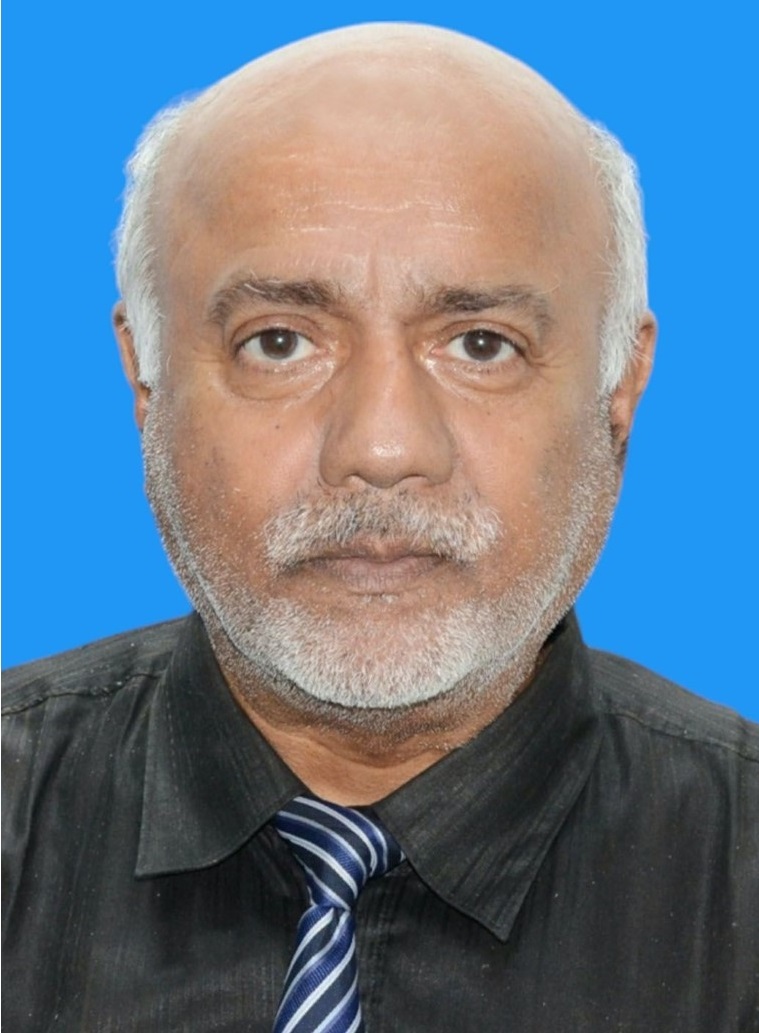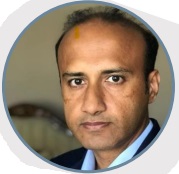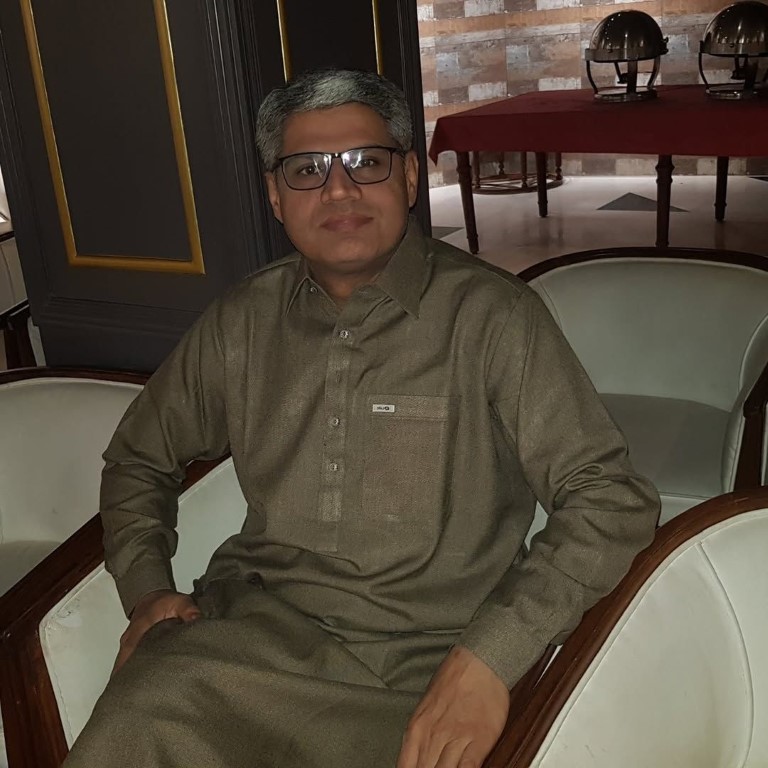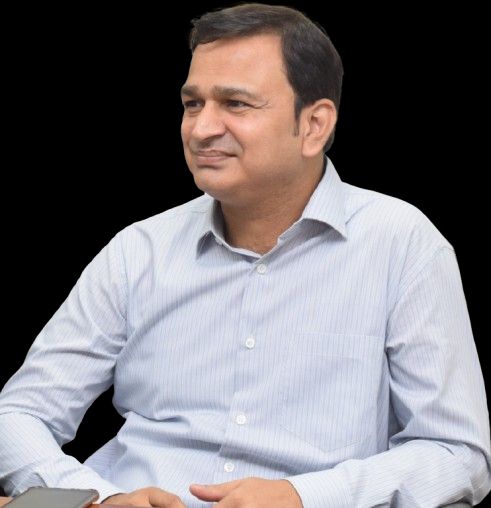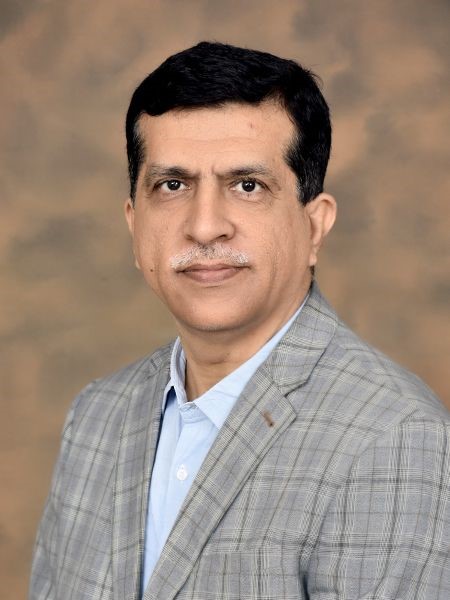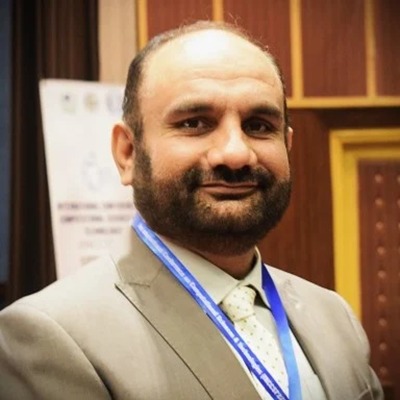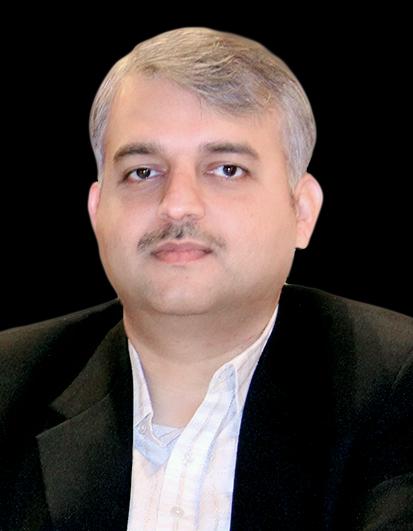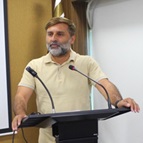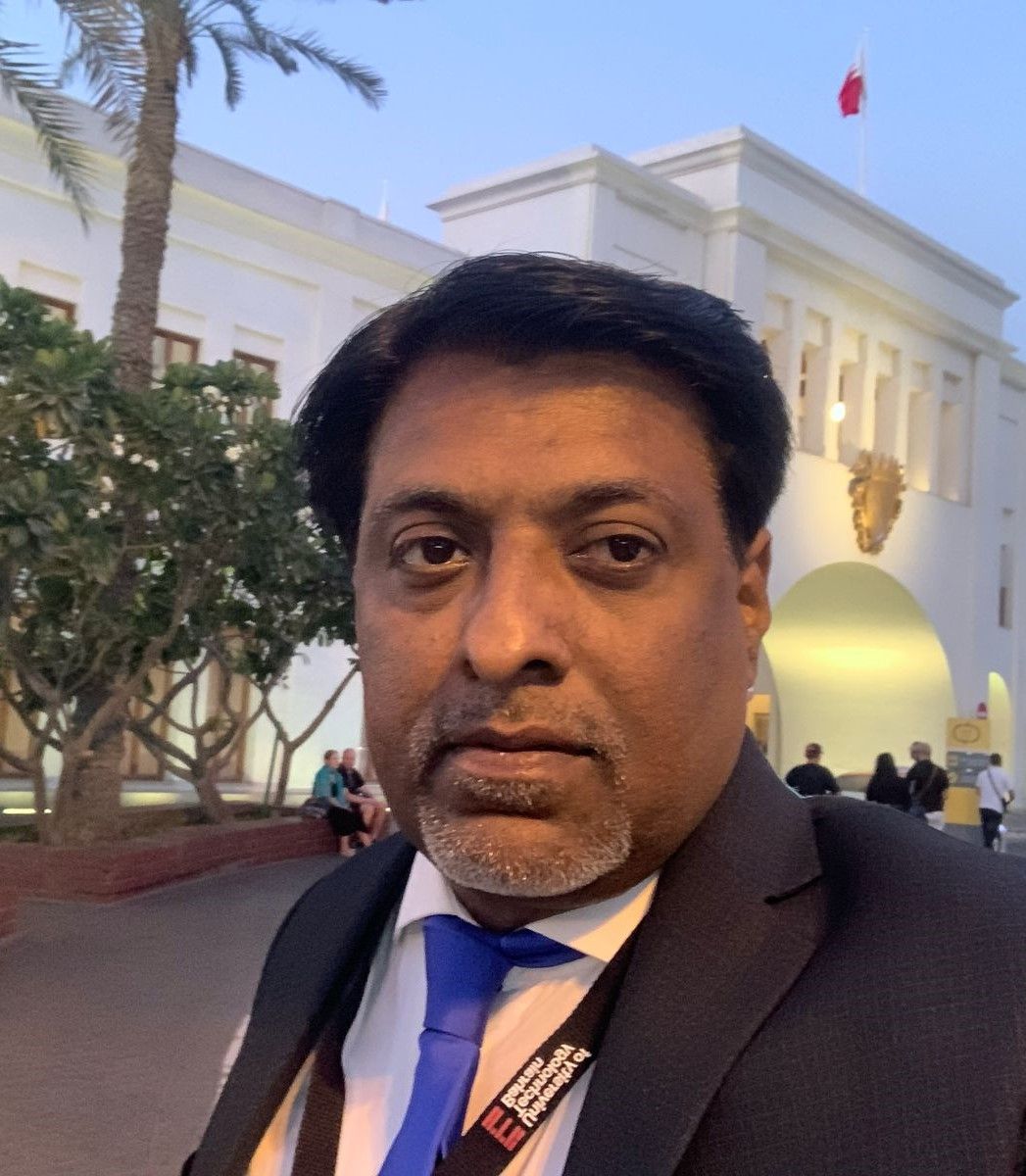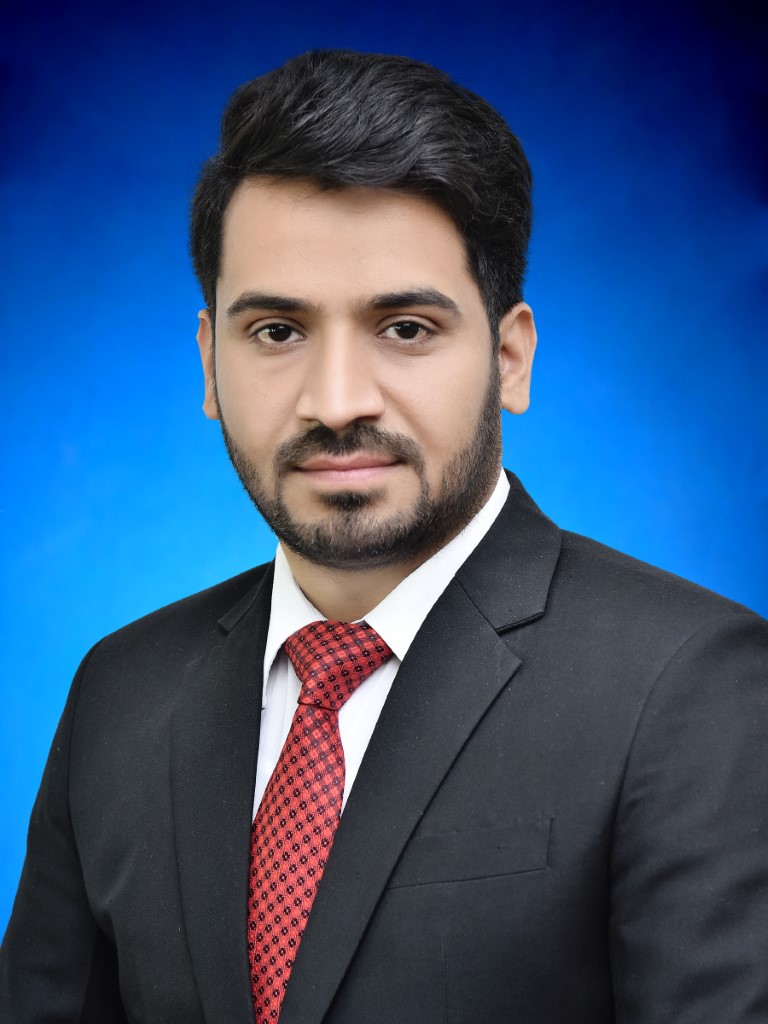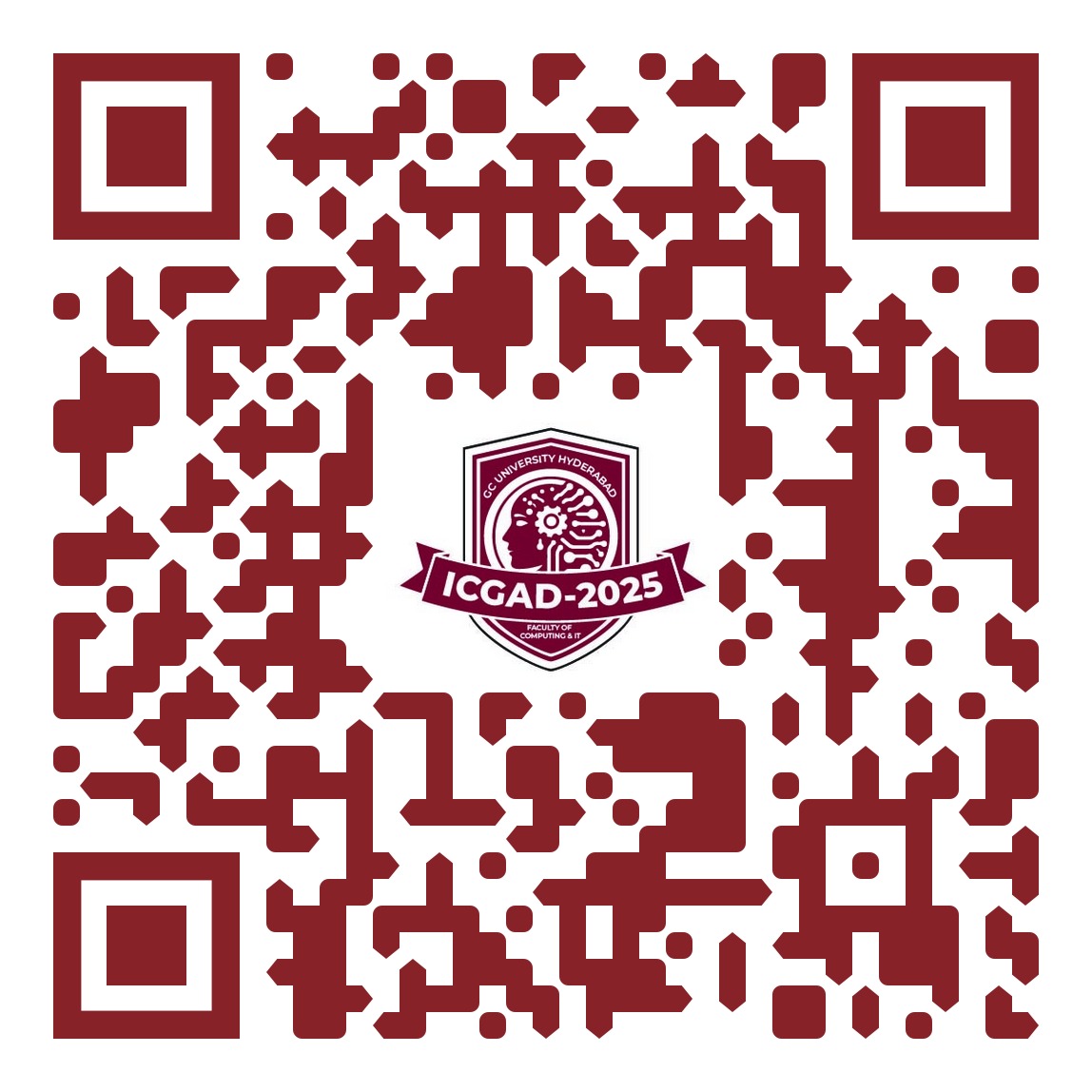About the Conference
Welcome to the 1st International Conference on Contemporary Challenges in Generative and Explainable Artificial Intelligence (AI), Data Privacy, and Cybersecurity (ICGAD-2025) scheduled on May 2nd and 3rd, 2025 organized by the Faculty of Computing and Information Technology at GC University Hyderabad. This conference is hosted at GC University Hyderabad and Funded by Sindh Higher Education Commission (SHEC), Government of Sindh. This 1st international conference (ICGAD-2025) shall serve as a premier platform for researchers, scientists, engineers, and industry professionals from around the world together, exchange ideas, and explore the latest advancements in the fields of generative and explainable AI, data privacy, and cybersecurity.
Vice Chancellor's Message
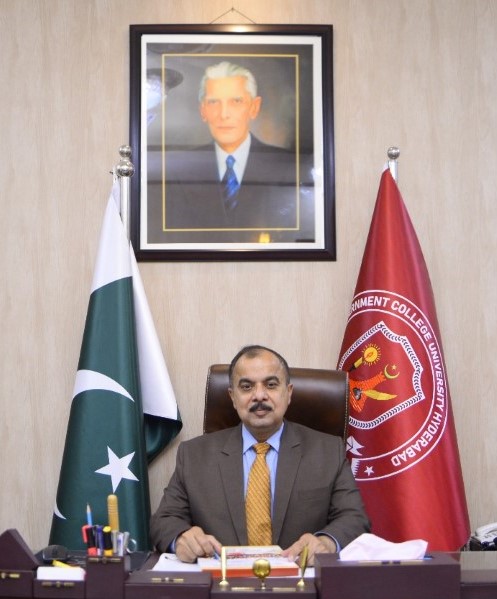
It is my great honor to extend a warm welcome to all participants, speakers, and distinguished guests to the 1st International Conference on Contemporary Challenges in Generative and Explainable Artificial Intelligence (AI), Data Privacy, and Cybersecurity (ICGAD-2025) at GC University Hyderabad, Faculty of Computing and Information Technology scheduled on May 2nd and 3rd, 2025.
As the Patron of this significant 1st International conference. I would like to express our sincere acknowledgment to Sindh Higher Education Commission (SHEC), Government of Sindh for their generous funding and unwavering support, which have made the 1st International Conference possible. I am truly pleased to witness the gathering of brilliant minds and leaders from around the world, united to address some of the most current scenario and beyond challenges in the ever-evolving fields of Artificial Intelligence, data privacy, and cybersecurity.
In today’s rapidly advancing digital age, the challenges and opportunities presented by generative AI, the need for explainability, and the protection of data have become central to shaping a secure technological future. This international conference provides an invaluable platform to explore these contemporary challenges, exchange ideas, and collaborate on innovative solutions that will shape the future of AI development, cybersecurity practices, and data privacy protocols.
I encourage all participants to engage in open dialogue, form robust partnerships, and contribute to the shared vision of advancing knowledge and creating a more transparent digital world. Together, we have the power to shape future-oriented technologies and ensure that innovation serves humanity’s best interests.
On behalf of the organizing committee and my institution, I wish you all a productive and inspiring experience at ICGAD-2025. May this conference inspire new insights, collaborations, and strategies that will lead to transformative advancements in these essential areas.
Warm regards,
Prof. Dr. Amjad Ali Arain
Vice Chancellor and Patron
GC University Hyderabad
Chief Organizer Message

It is with immense pleasure and great excitement that I extend a warm welcome to all students, researchers, practitioners, and experts who are attending the 1st International Conference on Contemporary Challenges in Generative and Explainable Artificial Intelligence (AI), Data Privacy, and Cybersecurity (ICGAD-2025) at GC University Hyderabad, Faculty of Computing and Information Technology scheduled on May 2nd and 3rd, 2025.
As we stand at the crossroads of innovation and technological advancement, Artificial Intelligence, data privacy, and cybersecurity have never been more crucial to our global society. With AI's transformative potential, alongside the growing challenges of ethical use, security concerns, and transparency, it is essential that we come together to address these issues directly. ICGAD-2025 offers a unique platform for us to engage in thought-provoking discussions, share groundbreaking research, and collaborate on solutions that will shape the future of AI technologies.
This international conference serves not only as a venue to explore the latest trends and developments in generative AI, explainable AI, and data privacy, but also as an opportunity to reflect on the broader impact these technologies have on individuals, organizations, and societies at large. As we navigate through these complex landscapes, our collective contributions will be vital in ensuring the responsible, transparent, and secure deployment of AI systems.
I encourage each of you to engage deeply with the diverse perspectives presented throughout the international conference, build valuable connections, and challenge the status quo. Together, we have the potential to chart a path toward a more secure, transparent, and equitable future powered by AI.
Thank you for your participation, and I look forward to the fruitful discussions and collaborations that will emerge from 1st International Conference on Contemporary Challenges in Generative and Explainable Artificial Intelligence (AI), Data Privacy, and Cybersecurity (ICGAD-2025).
Regards,
Prof. Dr. Imtiaz Ali Brohi
Chief Organizer
ICGAD-2025
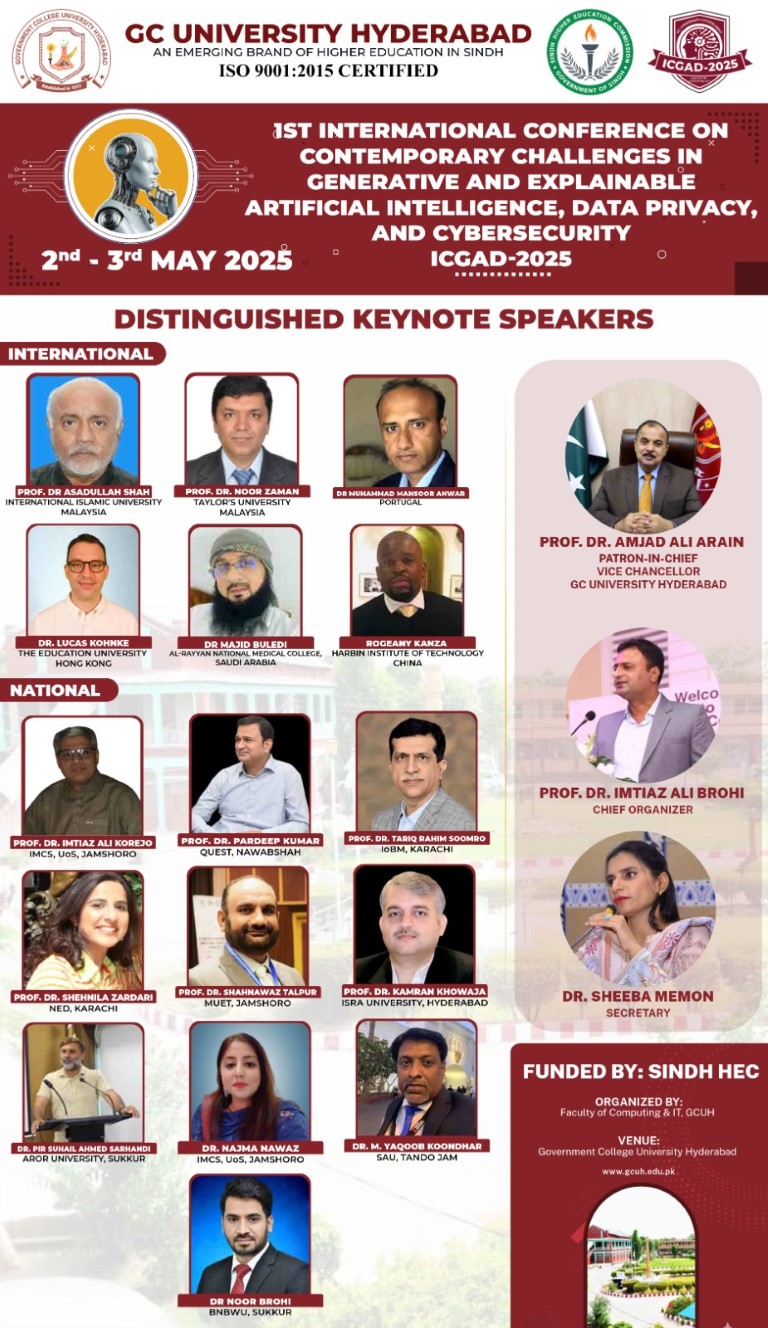
Call For Paper
SDG TARGETS & RELATED THEMATIC AREAS
- Data Privacy
- Generative AI
- Cybersecurity
- Explainable AI
- Image processing;
- Software engineering;
- Cybersecurity approach;
- Computational intelligence;
- Human-computer interaction;
- Bioinformatics and biostatistics;
- Policies and regulations for ensuring sustainable practices in ICT
- ICT and Applications for Coastal flooding and erosion and Shoreline Protection;
- Sustainability and innovation in computer production and computer parts recycling;
- Mobile computing and applications;
- ICT and applications for Green IT;
- Game technologies and gamification;
- Energy-efficient ICT and Applications;
- Computational innovation and sustainability;
- ICT and Applications for Sustainable Development;
- ICT Applications for Environmental Sustainability;
- Intelligent data engineering and automation;
- Data mining;
- Educational technology/E-learning/ Mobile explorative learning
- ICT and Applications for Transforming Society towards Environmental Sustainability;
- ICT and Applications for improving activities in the energy, water, and agriculture sectors;
- Digital technologies, computational advances and sustainable innovations for industry improvements;
- ICT and Applications for Transforming Businesses towards Environmentally Sustainable actions and production systems;
- ICT and Applications for Sustainable Infrastructures (including smart energy-efficient buildings, cities, factories);
- ICT and Applications for sustainable development (including agriculture, fisheries, tourism, human health, public safety, etc.);
SUBMISSION LAST DATE : 28 APRIL 2025
ACCEPTANCE NOTIFICATION : 29 APRIL 2025
REGISTRATION DEADLINE : 30 APRIL 2025
CONFERENCE : 2-3 MAY 2025
Speakers Information
Prof. Dr Asadullah Shah
International Islamic University Malaysia
Prof. Dr. Noor Zaman
Taylor's University, Malaysia
In the rapidly evolving digital landscape, the rise of Generative Artificial Intelligence (GenAI) has introduced groundbreaking advancements alongside unprecedented cybersecurity challenges. While GenAI enhances automation, creativity, and efficiency, it also empowers malicious actors with sophisticated tools for deepfakes, phishing, automated malware, and adversarial attacks. This keynote address explores the dual-edged impact of GenAI on cybersecurity, highlighting critical issues such as AI-driven social engineering, data poisoning, and the manipulation of AI models. Additionally, it examines the challenges in detecting AI-generated threats, ensuring model integrity, and establishing robust regulatory frameworks. The discussion will also propose mitigation strategies, including AI-augmented defense mechanisms, ethical AI governance, and collaborative industry efforts to safeguard digital ecosystems. By addressing these challenges proactively, organizations can harness the benefits of GenAI while minimizing its risks, ensuring a secure and resilient future in the age of intelligent automation.
Dr Muhammad Mansoor Anwar
King Abdulaziz University, Jeddah, Saudi Arabia
Artificial Intelligence (AI) is no longer a distant concept in education - it is actively reshaping the way languages are taught and learned. In this plenary, we explore how AI technologies are moving language education from traditional, one-size-fits-all models toward personalized, adaptive, and learner-centered ecosystems.
AI-driven platforms offer instant feedback, tailor learning paths to individual need , and enable authentic, immersive experiences through conversational bots, intelligent tutors, and virtual environments. As AI takes over routine tasks, teachers are evolving into learning architects, creative mentors, and critical thinkers' coaches - focusing on skills that machines cannot replicate.
However, the rapid integration of AI also brings critical challenges: ensuring ethical use of learner data, avoiding algorithmic bias, and guaranteeing equitable access for all students. This session invites educators to view AI not as a replacement, but as a powerful partner that, when thoughtfully implemented, can make language learning more human, inclusive, and inspiring.
The future of language education with AI is not pre-written - it is a story we are coauthoring together.
Dr. Lucas Kohnke
The Education University of Hong Kong
As generative artificial intelligence (GenAI) becomes increasingly embedded in English language education, TESOL educators stand at a pivotal moment. We face both exciting opportunities and serious challenges in preparing pre-service and in-service teachers to engage with these technologies critically, ethically, and effectively (Kohnke et al., 2023a; Kohnke et al., 2023b; Moorhouse & Kohnke, 2024). Rather than relying on traditional, outdated methods, we must evolve to meet the demands of modern classrooms. The future of language education depends on our ability to cultivate essential new literacies-digital, ethical, and pedagogical-that allow teachers not only to use AI tools, but to do so thoughtfully and sustainably (Kohnke & Zou, 2025a; Kohnke & Zou, 2025b).
At the heart of this evolution lies an essential question: How can TESOL educators redefine their professional competencies in response to GenAI while maintaining the human-centered pedagogies that make language learning meaningful? The answer is not to chase every new tool or overhaul curricula with every technological advance. Instead, we must adopt sustainable strategies that integrate AI in ways that enhance, rather than overwhelm, our teaching practices (Moorhouse et al, 2024). By focusing on adaptability and critical engagement, we can ensure that language classrooms remain spaces where communication, creativity, and human connection are prioritized-even as we embrace the new possibilities that AI offers (Kohnke et al., 2025a, Kohnke et al., 2025b).
This presentation will offer practical strategies for preparing future-ready language educators and highlight key directions for future scholarship in this rapidly developing field. By leading the way in sustainable AI integration, TESOL educators can help shape classrooms that are technologically current yet fundamentally human at their core. The future of TESOL is not about AI replacing teachers; it is about empowering teachers to work alongside technology, using it to make language learning richer, more accessible, and more meaningful than ever before.
Dr Majid Buledi
King Abdulaziz University, Jeddah, Saudi Arabia
Artificial intelligence (AI) changes the way we live, learn, and work. While AI brings exciting new opportunities, it also introduces serious challenges, especially around fairness, safety, and privacy. It is important to prepare both students and professionals to not only use AI tools but to understand their risks and responsibilities. This presentation will explore how to build educational content/programs that focus on teaching the skills and mindset needed for responsible AI use.
We will look closely at key areas such as Generative AI, Explainable AI (XAI), Data Privacy, and Cybersecurity. Learners need to understand how AI creates content, how AI decisions can be explained, and how to protect personal information and secure AI systems. Critical thinking, ethical decision-making, and basic technical knowledge must be part of every AI learning journey.
Practical teaching methods will also be discussed, such as project-based learning, using real-world case studies, encouraging teamwork across different fields, and setting up discussions about ethical questions. These methods help students and professionals connect theory with practice and prepare for real challenges in the workplace.
The goal is to empower learners not just to use AI but to question it, guide it, and innovate with it safely and fairly. We must teach future AI users and leaders to think carefully about the impact of their work and to build systems that are transparent, fair, and secure. Preparing the next generation in this way is essential for building an AI-driven future that benefits everyone.
Rogeany Kanza
Harbin Institute of Technology, China
Prof. Dr. Imtiaz Ali Korejo
IMCS, University of Sindh
Prof. Dr. Pardeep Kumar
Quaid-e-Awam University of Engineering, Sciences & Technology, Nawabshah
The Internet of Things (IoT) is rapidly turning futuristic ideas from Sci-Fi movies into reality by connecting physical and virtual objects to the Internet. This evolution is shaping the future Internet and providing guidance on how 'smart things' can enhance business, information, and social processes, ultimately improving human life. Furthermore, Digital Twins, virtual replicas of physical data or systems, can work alongside IoT to monitor real-time behavior and address challenges promptly, benefiting businesses and consumers alike.
By utilizing data from IoT-enabled devices, digital twins can monitor the behavior and status of a system in real-time, enabling companies to promptly address potential challenges. This mutual relationship between digital twins and IoT enhances their effectiveness and hence are beneficial for both businesses and consumers.
The talk will begin by providing a comprehensive look at the evolution of computational technology throughout history. Following this, the introduction and challenges of IoT and Digital Twin will be thoroughly examined. The discussion will also delve into the distinctions between these two technologies and how they complement each other. Lastly, recommendations and future research directions will be explored.
Prof. Dr. Tariq Rahim Soomro
Institute of Business Management, Karachi
Prof. Dr. Shehnila Zardari
NED University of Engineering and Technology
Prof. Dr. Shahnawaz Talpur
Mehran University of Engineering and Technology, Jamshoro
In the dynamic realm of modern computer architecture, transcending the binary realm to explore the nuanced art and science behind it. As we stand at the height of a digital revival, architects play a pivotal role in defining the contours of our technological future. The session unravels the intricate dance between architectural choices and the ever-expanding possibilities of modern computing. From parallel processing to quantum leaps, we will examine how innovative architectural designs propel us into uncharted territories, shaping the very fabric of our digital existence. Join us for an enlightening journey that underscores the profound impact of architectural decisions on the trajectory of technology.
Prof. Dr. Kamran Khowaja
Isra University, Hyderabad
Artificial Intelligence (AI) is transforming the entire care continuum of autism spectrum disorder (ASD) from the earliest indications of risk to the provision of personalized interventions. The number of individualis diagnosed with ASD is increasing worldwide on a daily basis and affects millions of children and families around the globe, but timely diagnosis and access to specialized care remain significant challenges. The rapid change in the tools and technologies powered by AI can detect developmental differences in infants and toddlers through the subtle behavioral markers of gaze, speech prosody, and motor gestures, with a level of precision and efficacy previously unattainable. This remarkable feat is the result of advancements in machine learning, computer vision, and natural language processing. The first part of the talk will introduce the ASD, behaviors, and the use of technolgoies for their interventions in general.
The second part of the talk will focus on how AI can aid at the level of clinical decision-making. Deep learning models trained on multimodal datasets of genetics, neuroimaging, and clinician images have the potential to optimize the standardization of diagnoses, mitigate the influence of bias, and uncover camouflaged phenotypic subtypes.
The talk will end with the focus on newer intervention platforms that feature the use of serious games, augmented reality, virtual reality, or mixed reality environments, socially assistive robots, and adaptive AI technologies which foster constructive engagement, enhance emotional regulation, and socially-responsive learning. Tailored to each child's specific profile, these platforms facilitate dynamic customization and evolution of the learning experience.
Dr. Pir Suhail Ahmed Sarhandi
Aror University, Sukkur
In today's world, where digital innovation is rapidly changing how we live and learn, mobile explorative learning offers a powerful chance to transform education, especially in developing countries like Pakistan. This talk will delve into how mobile technologies can support inquiry-based, student-centered learning that goes beyond the traditional classroom setting. We'll look at how smartphones and mobile apps can create engaging, personalized learning experiences that encourage critical thinking and creativity. Yet, implementing these approaches in Pakistan comes with its own set of challenges, such as differences in infrastructure, a lack of teacher training, cultural resistance to new teaching methods, and economic barriers. By sharing recent case studies and research, this discussion will highlight both the exciting possibilities and the obstacles of mobile explorative learning. We'll propose practical strategies to help bridge the gap between digital tools and effective teaching in Pakistani schools. Ultimately, this talk aims to foster a conversation among educators, policymakers, and tech experts about how we can work together to build an inclusive and forward-thinking education system for all students.
Dr. Najma Imtiaz
IMCS, University of Sindh
Given the high volume of generative AI inference workloads, data centres currently account for about 1 - 1.5 % of global electricity consumption, mainly due to transformer based models responding to a billion queries a day. Electricity demand from AI engineered data warehouses is set to grow near double of what is projected by the end of 2030 which is at the same level as Japan's current national consumption. However, with this rapid growth, there is no common tool to predict the carbon footprint of inference for varied model architecture and hardware options.
Carbontracker and CodeCarbon integrate with real-time power consumption readings from their interactors and the metadata collected via the Eco2AI library is used to estimate carbon footprint from the Generative AI inference for individual units of work in real time. A dataset ofParameter count, sparsity ratio, throughput, energy per request (kWh), and CO2 emissions per request (kg) was inferred on instrumented codings of such LLMs as GPT-2, GPT-Neo, and BLOOM for various quantization levels, batch sizes, and hardware environments. Using this dataset, gradient boosted decision tree models (LightGBM) trained on the dataset generalize well, with R2 > 0.9 and mean absolute error < 0.05 kWh per request on held out model - hardware pairs. Actionable per request forecasts of CO2 permit outcome dependant quantisation level and batching strategies to prevent from exceeding defined carbon budgets. They illustrate parts of the performance optimization and Green AI paradigm where the performance of carbon aware generative and AI deployments at scale can be optimized.
Dr. Muhammad Yaqoob Koondhar
Sindh Agriculture University, Tando Jam
The 21st century has given rise to innovative teaching and learning models, among which Pervasive Learning (P-Learning) has gained increasing prominence. Enabled by the decreasing cost of handheld devices, advancements in mobile technology, and the ubiquity of internet access, P-Learning surpasses traditional educational boundaries of time, place, media, and device dependence. It offers learners and educators the flexibility to access digital learning materials anytime, anywhere, with any device and in any medium, thereby supporting continuous, lifelong learning. The concept of P-Learning as a dynamic, technology-enhanced, and location-independent model of education. Unlike conventional learning environments confined to classrooms and schedules, P-Learning enables seamless integration of education into daily life through smartphones, tablets, and other connected devices. It facilitates not only formal teaching and learning but also informal, self-directed learning, supporting both synchronous and asynchronous engagement. Special emphasis is placed on the inclusive potential of P-Learning, particularly for individuals who face physical disabilities or geographic isolation. Through access to live-streamed and pre-recorded audio/video lectures, these learners can actively participate in academic experiences without requiring physical attendance. The study argues that P-Learning represents a critical shift toward more accessible, flexible, and equitable education in the digital age, making it a vital component of 21st-century learning frameworks.
Dr. Noor Ahmed Brohi
Begum Nusrat Bhutto Women University (BNBWU), Sukkur
The future of Human Resource Management is not just digital - it is intelligent. In this keynote, we journey into the powerful intersection where Artificial Intelligence meets human potential. AI is no longer a distant innovation; it is here, reshaping how we attract talent, nurture careers, foster diversity, and build workplaces where every individual can thrive. This session will illuminate how AI tools - from predictive hiring algorithms to intelligent learning platforms - are unlocking a new era of personalization, efficiency, and strategic foresight in HRM. But technology alone isn't enough. True transformation happens when we blend the power of AI with the irreplaceable strengths of empathy, creativity, and human connection. Together, we will explore real-world success stories, challenge myths, confront ethical dilemmas, and envision a future where AI doesn't replace HR professionals - it empowers them to become architects of thriving, inclusive, and resilient organizations. Let's step boldly into this new chapter - because the future of HR is not just smart, it's profoundly human.

